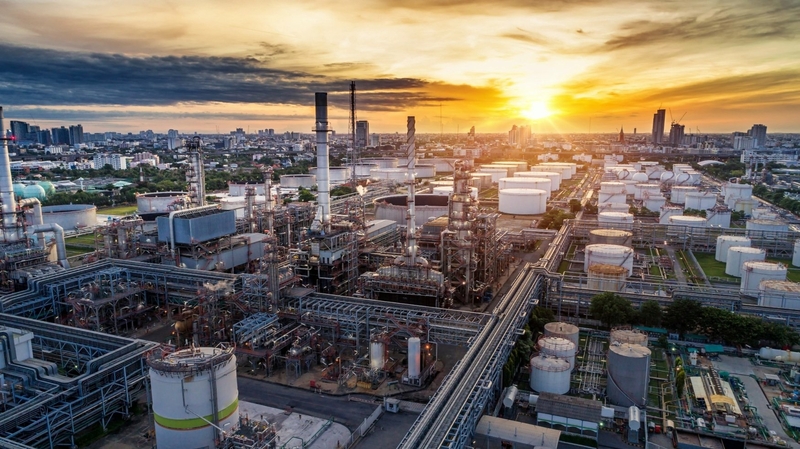12 May 2021
Bangchak shows strong Q1 performance New High for retail marketing, lubricants, and Inthanin Maintain momentum for all stakeholders and sustainability
Bangchak announced its Q1/2021 performance recording total revenue of THB 41,230 million, EBITDA of THB 4,737 million, and net profit attributable to owners of the parent at THB 2,284 million, or earning per share of THB 1.59. Retail sales recorded 390 million liters per month, while lubricants and Inthanin recorded new highs in March, indicating strong liquidity, and continuing to take care of all stakeholders for sustainability as the leader in energy transition.
Chaiwat Kovavisarach, President and Chief Executive Officer of Bangchak Corporation Public Company Limited stated that the Q1/2021 of the Company and its subsidiaries recorded revenue from the sale of goods and rendering of services in the amount of THB 41,230 million (24% QoQ, -4% YoY) ), EBITDA of THB 4,737 million (72% QoQ, 286% YoY). Bangchak Group recorded Inventory Gain at THB 2,473 million from an increase in the price of global crude oil along with stockpiling diesel beginning in June 2020, when costs were low to meet demand during the major turnaround maintenance. This alone accounts for more than THB 600 million in profits, softening the continued low levels of Operating GRM as a result of the Major Turnaround.
Despite a decline in total sales volume of the Marketing Business as a result of the COVID-19 outbreak, which as seen a new wave of infections since December 2020, as the situation stabilized saw the return of travel and road traffic, the retail market recorded a new high of 390 million liters per month, and similarly the Marketing Business was able to continue its momentum recording a new high of 8.9 million liters in March, which saw retail sales volume market share for lubricants grow to 11% from the previous year’s 9%. Inthanin Coffee also recorded new highs in March, from the continued positive reception of its 100% Arabica coffee, and the emergence of Inthanin Cocoa Fever, which has emerged as Inthanin’s hero product, recording more than 50% growth (QoQ) despite the effects of the outbreak in January.
In the first quarter of 2021, the Company and its subsidiaries recorded revenue from the sale of goods and rendering of services in the amount of THB 41,230 million (24% QoQ, -4% YoY, EBITDA of THB 4,737 million (72% QoQ, 286% YoY), and reversal from impairment of assets under the Exploration and Production Business in the amount of THB 400 million. Resulting in this quarter recording the net profit attributable to owners of the parent at THB 2,284 million (808% QoQ, 149% YoY) or earning per share of THB 1.59. With performance for each business unit as follow:
1. Refinery and Oil Trading Business
- Performance improved by 302% QoQ and 193% YoY. Mainly, from this quarter recording an Inventory Gain of THB 2,180 million, whereas in Q1/2020 and Q4/2020 recorded Inventory Loss, despite the Operating GRM adjusting downward and remains at low levels. During this quarter Operating GRM was at THB 576 million, or 3.24 $/BBL, due to the Bangchak refinery having undergone a major turnaround maintenance, which resulted in average production rate in Q1/2021 reduced to 64.9 KBD or 54% utilization rate. And, the yield of high value finished products declined significantly, especially Gasoil and Gasoline products
- Oil Trading business under BCPT Pte. Ltd., it recorded a decreasing in the crude oil and finished product transaction. Whereas gross profit rose, mainly from the low Sulphur fuel oil products and Gasoline. Due to the recovery of the economy after the COVID-19 outbreak has begun to subside.
2. Marketing Business
- Performance improved by 61% QoQ and >1,000% YoY due to this quarter recording an Inventory Gain, whereas Q1/2020 recorded an Inventory Loss. Despite the total sales volume of the Marketing Business having declined by 3% QoQ and 13% YoY due to the effects of the new emerging phase of COVID-19 outbreak since December 2020. The industrial market is still highly affected due to the aviation industry still had not been able to make a recovery, which has caused sales of Jet fuel to decline by 83% YoY, meanwhile the retail market was not affected by much.
- Net marketing margin declined by 2% QoQ and 4% YoY due to the company being unable to adjust its service stations retail price to coincide with the rise in cost of finished product, B100 and ethanol throughout the quarter. However, the Company managed sales during the annual turnaround maintenance 2021 through selective products and distribution channels with appropriate marketing margin, resulting in the net marketing margin per unit decreasing slightly. The Company recorded cumulative retail sales volume market shares between January - March 2021 at 15.9% (data from Department of Energy Business, Ministry of Energy), and the number of service stations as of the end of Q1/2021 was 1,243 stations.
- The Company maintains its focus on expanding its Non-Oil business, this year is the 15th anniversary of the Inthanin Coffee Shop. Additionally, it has been determined to continuously expand locations both inside and outside of service stations. As of the end of Q1/2021, there are 694 branches of Inthanin Coffee Shops.
- Furthermore, the Company, in cooperation with the Provincial Electricity Authority debut EV charging stations, PEA VOLTA, within Bangchak service stations on main highways headed to major cities and tourist attractions. Currently, there are 18 stations in 11 provinces across the country in operation.
3. Power Plant Business
- Performance improved by 13% QoQ and 27% YoY due to this quarter realizing shares of profit from its investments in associate company THB 140 million. Whereas, the previous quarter a share of loss from its investments associate company was realized, mainly from the Geothermal Power Plant Business in Indonesia recorded expenses related to the refinancing of its previous debt of THB 172 million in Q4/2020. Total electricity sales declined by 34% QoQ, mostly from the quantity of electricity sold in Lao PDR declining due to the seasonal factor of hydro power plants. When comparing performance on a YoY basis, total electricity sales increased by 40% from the acquisition in new Solar Power Plant projects (PPA 20 MW), and the recognition of the full quarter contribution from the Hydro Power Plant, “Nam San 3B” (PPA 45 MW). Moreover, the higher rainfall from Q1/2020 resulted in the Hydro Power Plants in Lao PDR to record an increase in total electricity sales.
4. Bio-Based Product Business saw its performance declined by 28% QoQ and 17% YoY
- Biodiesel Production Business recorded a decrease in gross profit by 47% QoQ and 24% YoY due to the crude palm oil costs used in production during this quarter has increased, as a result of the draught that led to the historic low levels of crude palm oil stock. Moreover, sales volume declined in relation to the demand for consumption of Diesel fuel as a result of the new emerging phase of COVID-19 outbreak that occurred in late Q4/2020.
- Ethanol Production Business recoded a decline in sales volume of Ethanol products due to the population cutting back on travel, in order to curb the COVID-19 outbreak. This resulted in demand for Gasohol fuel consumption declining. Gross profit increased 25% QoQ from increases in production utilization and the ability to manage raw material cost, but decreased 21% YoY mainly from the volume of Ethanol products sold declining.
5. Natural Resources Business
- Performance declined by 86% QoQ, due to realizing a decrease in share of profit from investment in associate company, OKEA. Mainly attributed to the decline in sales volume of the Draugen field, despite the price of crude oil and natural gas has been increasing in relation to the state of the global market. Furthermore, Q4/2020 recorded a reversal of the impairment related to the Yme asset under development, meanwhile this quarter did not record. Moreover, realized significantly lesser gains on foreign exchange compared to the previous quarter, which is mostly from the conversion of loans in foreign currencies. The Norwegian Krone (NOK) against the US Dollar slightly changed in this quarter. Whereas, the Norwegian Krone (NOK) appreciated by 10% in the previous quarter. As for YoY performance, there was an increase of 103% from the increase in the realization of share of profit from investment in associate company, OKEA, due to the selling price of crude oil and natural gas that had increased, resulting in OKEA recording higher revenue. And, the impairment of assets was recorded in Q1/2020 due to the price of crude oil and natural gas declining significantly. Additionally, loss on foreign exchange was recorded due to the depreciation of NOK against the US dollar.
- However, Yme project is currently in the hook-up and commissioning phase with planned production start in the second half of 2021. Yme is expected to add production of 7,500 boepd net to OKEA, and 4,900 boepd net to OKEA on average over the first production year.
Throughout 2020, the COVID-19 outbreak has detrimental effects on the economy at a global scale. Despite in early 2021, the World Bank and the International Monetary Fund expected that the global economy is likely to make a recovery with support from the stimulus package and the distribution of vaccines in the major countries. This is observable in the price of oil price in the global market that has been increasing continuously, but there remains various challenges on many fronts. This includes the Thai economy that had been expected to make a recovery. However, the new emerging phase of COVID-19 outbreak that intensified during early April, and have quickly spread throughout the country. It may has severely impacted the Thai economy for a further period of time, especially in the second quarter. But, its severity is not as intense as the same period of the previous year. The company group still emphasizes the health and safety of its employees, customers, and related parties by continuously following measures to prevent and control the spread of COVID-19. In terms of business conduct, the situation is being monitored closely in order to adequately adjust business plans and done so in a prompt manner. Also, strict cost controls were implemented to lower expenses and to efficiently utilizing the capital investment in order to mitigate the effects of what has transpired. This includes the management of working capital to conduct business in a continuous and smooth manner.




